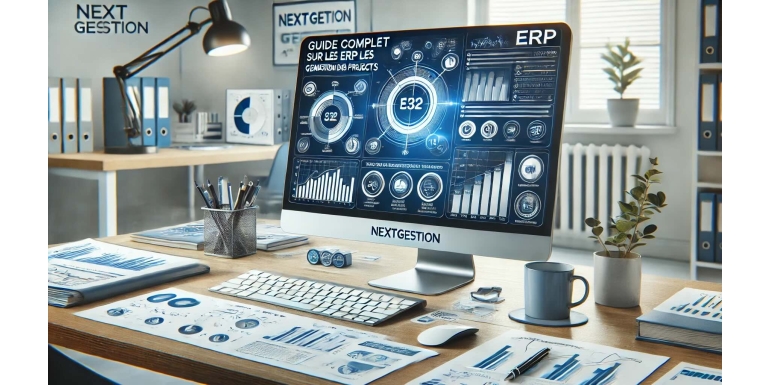
In a world where effective project management is crucial for business success, Enterprise Resource Planning (ERP) systems have become indispensable tools. This article offers a comprehensive guide on using ERPs for project management, exploring their benefits, key features, and how to implement them effectively.
1. Introduction to ERPs and Project Management
What is an ERP?
An ERP, or Enterprise Resource Planning system, is a suite of integrated applications that manage various aspects of a business, such as accounting, human resources, supply chain management, and more. ERPs centralize data, facilitating quicker and more informed decision-making.
Why are ERPs Essential for Project Management?
Project management involves numerous elements, including planning, execution, monitoring, and closure. ERPs provide a unified view of all these stages, allowing project teams to collaborate effectively, meet deadlines, and manage budgets more accurately. They also help track project progress in real-time, which is essential to ensure everything stays on track.
2. Benefits of ERPs for Project Management
Data Centralization
One of the main advantages of ERP systems is data centralization. All team members have access to the same information, reducing the risk of errors and misunderstandings. This also fosters better communication between different departments.
Enhanced Visibility and Reporting
ERPs offer advanced reporting tools that enable project managers to obtain accurate analyses of task progress, expenditures, and resource usage. This promotes informed and rapid decision-making.
Resource Optimization
ERP systems allow for efficient resource management. By providing an overview of available resources, managers can effectively allocate personnel and materials, minimizing costs and maximizing efficiency.
Task Automation
ERPs automate many administrative tasks, such as invoice management, expense tracking, and meeting scheduling. This frees up time for team members, allowing them to focus on higher-value tasks.
3. Key Features of ERPs for Project Management
Planning and Task Management
Modern ERPs provide robust planning features that allow for the creation of project timelines, milestone definitions, and task assignments. These tools help teams meet deadlines and manage priorities effectively.
Deadline and Budget Tracking
A good ERP system allows for real-time tracking of deadlines and budgets. Managers can see if a project is behind schedule or exceeding its budget, enabling quick corrective actions.
Collaboration and Communication
ERPs facilitate collaboration among team members through integrated communication tools. This includes features such as discussion forums, email notifications, and real-time updates.
Risk Management
ERPs help identify and manage risks associated with projects. Through predictive analytics, managers can anticipate potential issues and develop strategies to mitigate them.
4. How to Choose the Right ERP for Project Management
Assessing Business Needs
Before choosing an ERP, it is crucial to assess your business's specific needs. What essential features are required for managing your projects? What integrations with other systems are necessary?
Considering Scalability
Choose an ERP that can scale with your business. Project management needs can change as the business grows, so an adaptable system is essential.
Checking Costs
ERP systems can vary significantly in cost. It's important to consider not only the initial cost but also ongoing maintenance, training, and technical support fees.
Requesting Demonstrations
Before making a decision, request demonstrations of ERP systems. This will allow you to see how the software works in practice and whether its features meet your team's needs.
5. Implementing an ERP for Project Management
Planning the Implementation
Implementing an ERP requires careful planning. Create a timeline that outlines the various project phases, including user training, data migration, and testing.
User Training
Proper user training is essential to ensure the success of the ERP. Organize training sessions to familiarize team members with the system and its features.
Data Migration
Data migration from old systems to the new ERP must be done carefully. Ensure that all important data is transferred correctly and that data quality is maintained.
Monitoring and Evaluation
Once the ERP is in place, it's important to monitor its usage and evaluate its effectiveness. Gather user feedback to identify areas for improvement.
6. Case Studies: Success Stories of Using ERPs for Project Management
Case of a Construction Company
A construction company integrated an ERP to manage multiple projects simultaneously. Thanks to data centralization and reporting tools, it reduced project costs by 15% and met 95% of its deadlines.
Case of a Marketing Agency
A marketing agency adopted an ERP to manage its campaigns and client projects. Improved task management and collaboration led to a 30% increase in client satisfaction.
Case of an IT Services Company
An IT services company used an ERP to track time and resources allocated to each project. This resulted in better resource planning and a 25% increase in team productivity.
7. Future Trends of ERPs in Project Management
Integration of Artificial Intelligence
ERPs that incorporate artificial intelligence will allow for increased automation and deeper analytics. This will help businesses anticipate future needs and optimize their projects proactively.
Use of Blockchain
Blockchain could transform project management by offering solutions for transparency and traceability. This is particularly relevant in sectors where data security and verification are crucial.
Mobility and Accessibility
ERP systems will become increasingly accessible via mobile devices. This will enable project teams to track their tasks and collaborate regardless of their location.
Conclusion
ERPs play a crucial role in project management, providing tools and features that allow businesses to maximize their efficiency and profitability. By choosing the right ERP system and implementing it correctly, companies can not only improve their project management but also prepare to face future challenges. Leveraging the benefits of ERPs enables businesses to transform their way of working and achieve new heights.
